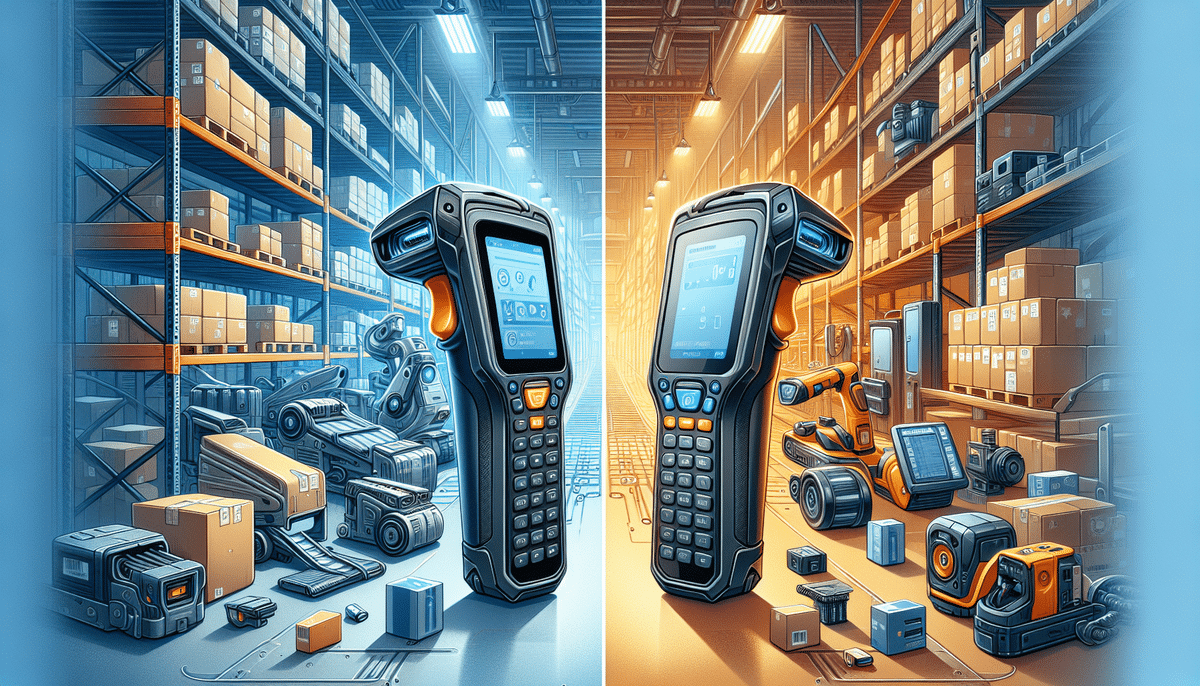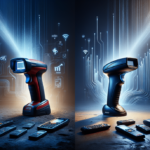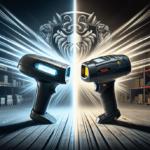Honeywell Granit 1911i vs. Zebra Symbol LS2208: Comprehensive Barcode Scanner Comparison
Choosing the right barcode scanner is essential for optimizing your business operations. Among the top contenders are the Honeywell Granit 1911i and the Zebra Symbol LS2208. This comparison delves into various aspects such as design, performance, connectivity, battery life, ergonomics, pricing, and ideal use cases to help you determine which scanner best fits your business needs.
Introduction to Honeywell Granit 1911i and Zebra Symbol LS2208
The Honeywell Granit 1911i and the Zebra Symbol LS2208 are two leading barcode scanners renowned for their reliability and performance. Manufactured by Zebra Technologies, a global leader in barcode scanning and printing solutions, both scanners cater to different business environments and requirements.
According to a 2019 industry report, the global barcode scanner market is projected to continue its growth, driven by advancements in technology and increasing adoption across various sectors. Selecting the appropriate scanner can significantly impact your operational efficiency and accuracy.
The Honeywell Granit 1911i is a wireless scanner equipped with Bluetooth connectivity, making it versatile for various applications. In contrast, the Zebra Symbol LS2208 is a corded scanner that utilizes USB connectivity, offering a straightforward and dependable scanning solution.
Design and Build Quality
Durability and Environmental Resistance
The build quality of a barcode scanner directly impacts its durability and longevity, especially in demanding environments.
- Honeywell Granit 1911i: Built for industrial settings, the Granit 1911i boasts a rugged design that meets IP65 standards, providing excellent protection against dust and water. It can endure drops from heights of up to 6.5 feet, making it suitable for harsh environments like warehouses and manufacturing facilities.
- Zebra Symbol LS2208: While the LS2208 is also durable, it is primarily designed for retail and hospitality settings. Its lightweight and compact build make it easy to handle, though it does not offer the same level of environmental protection as the Granit 1911i.
Ergonomic Design
Both scanners feature ergonomic designs, but their approaches differ to suit their intended environments.
- Honeywell Granit 1911i: Features a pistol-grip design that ergonomically reduces hand strain, making it comfortable for high-volume scanning tasks.
- Zebra Symbol LS2208: Boasts a lightweight and traditional handheld design, which is easy to maneuver but may not provide the same level of ergonomic support as the Granit 1911i during extended use.
Scanning Performance
Scanning Range and Accuracy
Effective scanning performance is essential for maintaining operational efficiency:
- Scanning Range: The Honeywell Granit 1911i offers an impressive scanning range of up to 32 inches, enabling it to scan barcodes from a greater distance. The Zebra Symbol LS2208, however, has a scanning range of up to 17 inches, which suffices for most retail applications.
- Scan Accuracy: Both scanners provide high accuracy rates, but the Granit 1911i's ability to read both 1D and 2D barcodes offers greater versatility in various scanning environments.
Barcode Compatibility
- Honeywell Granit 1911i: Can read both 1D and 2D barcodes, providing greater versatility for diverse inventory types.
- Zebra Symbol LS2208: Limited to scanning 1D barcodes, which is sufficient for standard retail products.
Durability
- Honeywell Granit 1911i: With an IP65 rating, it is more resistant to environmental factors compared to the LS2208's IP42 rating.
- Zebra Symbol LS2208: While durable for its intended use, it does not match the Granit 1911i's resistance to harsh conditions.
Connectivity and Battery Life
Connectivity Options
Connectivity plays a significant role in the flexibility and ease of use of barcode scanners:
- Honeywell Granit 1911i: Features Bluetooth connectivity, allowing it to wirelessly connect to devices like tablets, smartphones, and computers. It offers a substantial range of up to 300 feet, providing flexibility in large work environments.
- Zebra Symbol LS2208: Primarily uses USB connectivity, requiring a direct connection to a computer or other device. However, a variant named LS2208-SR20007R-UR includes Bluetooth connectivity with a range of up to 33 feet.
Battery Life
Battery longevity is critical for uninterrupted scanning operations:
- Honeywell Granit 1911i: Equipped with a battery that lasts up to 14 hours on a single charge, making it ideal for prolonged use without frequent recharging.
- Zebra Symbol LS2208: As a corded scanner, it does not rely on battery power, ensuring continuous operation as long as it remains connected to a power source.
Ergonomics and Comfort
Comfort during extended use can enhance productivity and reduce fatigue:
- Honeywell Granit 1911i: Features a pistol-grip design that ergonomically reduces hand strain, making it comfortable for high-volume scanning tasks.
- Zebra Symbol LS2208: Boasts a lightweight and traditional handheld design, which is easy to maneuver but may not provide the same level of ergonomic support as the Granit 1911i during extended use.
Pricing and Value
Budget considerations are often pivotal in decision-making:
- Honeywell Granit 1911i: Positioned at a higher price point, this scanner offers advanced features such as Bluetooth connectivity, extended scanning range, and superior durability, justifying the additional cost for businesses that require these capabilities.
- Zebra Symbol LS2208: More affordable, making it an attractive option for small to medium-sized businesses or those with tighter budgets. Its reliability and ease of use provide excellent value for its price.
According to Business News Daily, investing in a quality barcode scanner can enhance inventory management, reduce errors, and improve overall operational efficiency, making the initial cost a worthwhile investment.
Ideal Use Cases
Each scanner excels in different environments:
- Honeywell Granit 1911i: Best suited for industrial settings such as warehouses, manufacturing plants, and distribution centers where durability, extended range, and wireless connectivity are essential.
- Zebra Symbol LS2208: Ideal for retail, hospitality, and healthcare environments where portability, ease of use, and affordability are prioritized.
Pros and Cons
Honeywell Granit 1911i
- Pros:
- Wireless Bluetooth connectivity
- Extended scanning range (up to 32 inches)
- Durable and rugged design (IP65 rated)
- Comfortable ergonomic grip
- Long battery life (up to 14 hours)
- Ability to scan 1D and 2D barcodes
- Cons:
- Higher price point
- Heavier than some other scanners
Zebra Symbol LS2208
- Pros:
- Lower price point
- Lightweight and compact design
- Easy to use with a simple point-and-shoot mechanism
- Continuous operation with corded USB connectivity
- Compatible with a wide range of point-of-sale systems
- Cons:
- Corded USB connectivity limits mobility
- Shorter scanning range (up to 17 inches) compared to Granit 1911i
- Limited to scanning 1D barcodes
How to Choose the Right Barcode Scanner for Your Business
Selecting the appropriate barcode scanner involves evaluating several key factors:
- Scanning Range: Determine the distance from which you need to scan barcodes. Industrial settings may require longer ranges.
- Connectivity: Decide between wireless (Bluetooth) and wired (USB) connectivity based on your operational flexibility needs.
- Battery Life: For wireless scanners, longer battery life reduces downtime and enhances productivity.
- Ergonomics: Comfort during extended use can prevent fatigue and increase efficiency.
- Durability: Assess the environmental conditions where the scanner will be used to ensure it can withstand those conditions.
- Budget: Balance the features you need with your financial constraints to find the best value.
Researching and comparing different models based on these criteria will help you identify the scanner that best aligns with your business requirements.
Comparison of Key Features
| Feature | Honeywell Granit 1911i | Zebra Symbol LS2208 |
|---|---|---|
| Connectivity | Bluetooth (up to 300 feet) | USB (corded) or Bluetooth variant (up to 33 feet) |
| Battery Life | Up to 14 hours | N/A (corded) |
| Scanning Range | Up to 32 inches | Up to 17 inches |
| Barcode Types | 1D and 2D barcodes | 1D barcodes |
| Build Quality | IP65 rated, rugged design | IP42 rated, lightweight design |
| Ergonomics | Pistol grip design | Lightweight handheld design |
| Price | Higher | Lower |
Customer Reviews
Feedback from users highlights the strengths and weaknesses of both scanners:
- Honeywell Granit 1911i: Users commend its robust build quality, extended battery life, and reliable wireless connectivity. It's praised for handling high-volume scanning tasks efficiently in demanding environments.
- Zebra Symbol LS2208: Appreciated for its affordability, ease of use, and consistent performance in retail settings. Customers value its lightweight design and compatibility with various point-of-sale systems.
Overall, both scanners are well-regarded for their respective strengths, making them suitable choices depending on the specific needs of your business.
Conclusion
Both the Honeywell Granit 1911i and the Zebra Symbol LS2208 are excellent barcode scanners, each catering to different operational needs. By assessing your business environment, scanning requirements, budget, and desired features, you can select the scanner that will best enhance your workflow and operational efficiency.
Consider factors such as connectivity, battery life, scanning capabilities, and your operational environment to make an informed decision.
For more detailed specifications and purchasing options, visit the respective product pages:






















